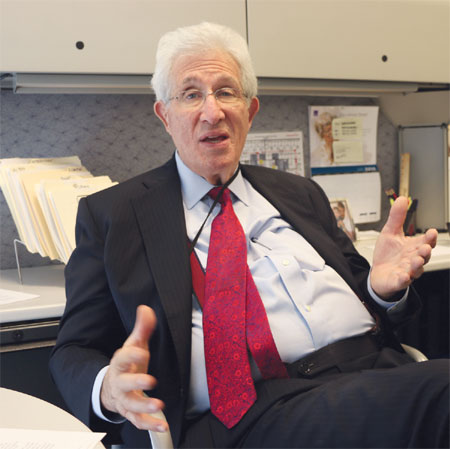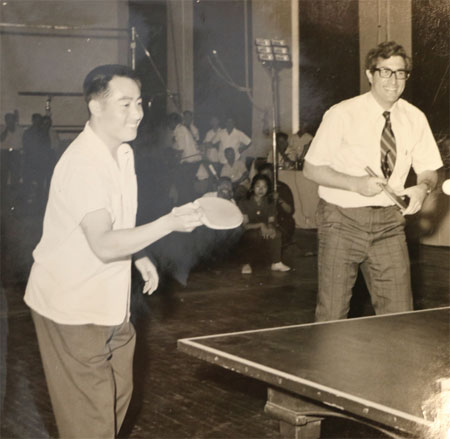A lifetime understanding China politics
Updated: 2014-09-19 12:12
By Chen Weihua in Washington(China Daily USA)
|
||||||||

At 77, veteran China hand Richard Solomon is working on a grand strategy for the United States, trying to figure out its role in the 21st century.
There is a host of very different challenges now compared with the Cold War era, everything from nuclear proliferation and cyber security to climate change and a food crisis.
Solomon, now a senior fellow at the Rand Corporation, a think tank, realized that many Americans since WWII just want to stay home and not bear the responsibility of a world leader. But, he said, that US leadership role is inevitable.
The rising China may be a factor in the grand strategy. But to Solomon, China and the US are not in a strategic rivalry, such as competing for the support of North Korea. "We want you to have North Korea, it's a pain in the neck for everybody," he said jokingly.
Strategic ambiguity
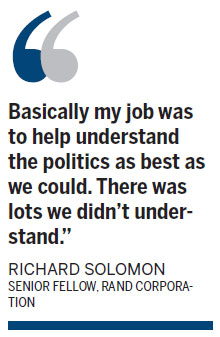
However, Solomon does think there is a strategic ambiguity in the bilateral relations between the world's two largest economies. Vast common interests aside, the distrust and differences are obvious, as China sides more often with Russia in the United Nations Security Council than with the US, and many Chinese, especially in the military, still see the US as a threat.
Solomon is deeply worried about the growing tensions in both the South and East China seas. "The reason I am pessimistic is because I see things heading towards the direction of confrontation," he said.
Like what his old boss Henry Kissinger stated in the latest book World Order, Solomon believes that China should work with the US for a Pacific partnership where there is no hegemonic power, either China or the US.
"The two share fundamental interests in security and economic development and social development. Shouldn't they work together instead of confrontation?" he asked.
"To me, both sides should work together in a cooperative way," he said, citing his experience in the Cambodia peace settlement in 1991 by working cooperatively with the Chinese. Solomon, who was then US assistant secretary of state for East Asian and Pacific affairs, led the US negotiation team for the 1991 Cambodia Peace Treaty which ended 21 years of conflict in the Southeast Asian nation.
Solomon agreed that managing differences between China and the US is no easy job. "This gets to politics. We don't fully understand Chinese politics," he said.
Working for Kissinger
But it was exactly because of his shrewd understanding of Chinese politics that in 1971, then National Security Advisor Kissinger invited him to join as a staff member of the National Security Council (NSC).
Solomon, then teaching Chinese politics at the University of Michigan, started his work in September that year, two months after President Richard Nixon announced Kissinger's secret trip to China.
"I was as surprised as everybody else," Solomon recalled of Nixon's announcement on the evening of July 15, 1971.

At the NSC, Solomon's job was to help Kissinger and others understand what was going on in China.
"Basically my job was to help understand the politics as best as we could. There was lots we didn't understand," he said, citing the Lin Biao case that took place also in September 1971. Lin was Mao's right hand who died in a plane crash in Mongolia after a failed coup.
At the NSC, Solomon also did some speech writing for Nixon. While Nixon's famous quote of Chairman Mao Zedong's poem "Seize the day, seize the hour" has often been brought to life, including in John Adams' opera Nixon in China, it was Solomon, who had studied Mao's poems, who put it in Nixon's speech.
With his training in China studies and interacting with many Chinese, Solomon was one of the first Americans who engaged in exchanges with people from the Chinese mainland when he accompanied the Chinese ping-pong team during its visit to the US in April, 1972, less than two months after Nixon made his historic trip to China to sign the Shanghai Communiqu.
First trip
When Solomon made his first trip to China in June 1972, following his boss Kissinger, he got a chance to play ping-pong side-by-side with Zhuang Zedong, the world table tennis champion who had developed a friendship with Solomon when leading the Chinese ping-pong delegation to the US that April.
Solomon's discoveries in China during the first trip did not surprise him very much. Instead, he found that from his previous stay in Hong Kong and Taiwan, there was a certain atmosphere in Chinese society that seemed familiar to him.
Solomon had spent two years in Hong Kong and Taiwan in the mid and late 1960s, studying Chinese language while interviewing people coming out of the Chinese mainland, about issues such as the food crisis there.
"These were our efforts to understand China, looking over the fence," Solomon said. At that time, Americans were not allowed to travel to the Chinese mainland.
Solomon's first book, Mao's Revolution and the Chinese Political Culture, was based on his interviews of more than 100 Chinese about their ideas of politics. Solomon said it was mainly because his professor, Lucian Pye, a noted professor of Chinese politics at MIT who was born in China of American missionary parents, believed that culture in the broad sense has an influence on political behavior.
Early interest in China
In fact, Solomon's interest in China was closely related to Pye. As an undergraduate at MIT, Solomon attended Pye's class on Asian politics in 1959 when China and the Soviet Union started their big polemic about whether the biggest problem in the communist world was leftism or rightism.
Solomon also sought to understand the issue better with another MIT professor, William Griffith, a specialist on communist politics.
"So in 1960 when I started my graduate work, I was very interested in China," Solomon said.
One day in 1961 when Solomon went to Pye's office to express his interest in China and specializing in the field, Pye was very excited. "Very good. Everbody studies Russia, but China would be a very worthwhile area to focus on," Solomon recalled Pye saying at the time.
While the two were talking, Walt Rostow, then head of policy planning at the US State Department who later became National Security Advisor, called Pye to see if anyone could do a study on how China was going to manage its food crisis at the time. Often known in China as the Three Years of Natural Disasters, the famine in China in the early 1960s was caused largely by the Great Leap Forward movement, an irrational industrialization and collectivization campaign in the late 1950s.
While Pye thought Solomon might work on the project, he also believed the young man should study more about China and the Chinese language. So he arranged for Solomon to attend Chinese language classes at Yale University in the summer of 1961, where people like Jay Rockefeller, now a senior US Senator from West Virginia, were also attending.
Solomon also went to Harvard to take classes with famous China scholars such as John Fairbank and Benjamin Schwartz.
A conservative
When he finished his PhD in 1966 and went to teach at the University of Michigan, he found everyone there was very excited about China "because our society was in turmoil because of the Vietnam War and because of the civil rights movement", he said.
Lots of students wanted to know how Mao made revolution. So Solomon had big classes and lots of students who wanted to know about the Chinese revolution.
While many US campuses were also in turmoil at that time, Solomon described himself as "neutral" trying to understand Chinese politics from the point view of a political scientist. "But politically, you will have to say that I was conservative," he said.
He joked that Kissinger actually had people investigate him before hiring him and found out that he was basically a conservative, not a political activist.
As the first generation of China specialist after the McCarthyism of the 1950s when many China hands in the US were brutally persecuted, Solomon admitted that he was aware at that time there was a certain risk because China was still a very sensitive topic in US politics. But he said he was not really scared.
When Solomon was first invited to join Kissinger's team, the arrangement was just for one year. But Kissinger clearly appreciated Solomon's work and invited him to stay on.
At that point, Solomon had to give up his academic work at the University of Michigan and ended up working for Kissinger and Brent Scowcroft, the National Security Advisor for President Gerald Ford, up until 1976.
Engaging China
Joining the Rand Corporation as head of its political science department in the same year, Solomon continued to develop a relationship with his Chinese counterpart. He recalled that at the end of 1979 when Defense Secretary Harold Brown arranged to have someone from China learn what a think tank was.
Solomon also served on the editorial board of the Chinese language edition of the Encyclopedia Britannica in the early 1980s.
"We had a terrible meeting in summer of 1982 in Harbin, it was very hot, no air conditioning at that time," he recalled.
But he was excited that with Chinese leader Deng Xiaoping's sanction, the Chinese carried a neutral policy in translation, when encountering sensitive figures such as Joseph Stalin.
To Solomon, China-US relations have gone through phases. China was an enemy and adversary in the 1950s and 1960s.
"People were all worried that we would have another war with China, like the one in Korea. That all changed when Nixon made the opening with Chairman Mao," he said.
He said for China specialists like himself, the normalization of relations with China was a world-changing event.
"It changed the dynamic of the Cold War," he said.
When Deng Xiaoping initiated the reform and opening in the late 1970s, Solomon said "we started working very closely with Chinese intellectuals and foreign policy specialists."
He agreed with Stapleton Roy, former US ambassador to China, when the latter described the 1980s as the golden period in US-China relations.
"Our relationship with China is ambiguous today. It's contradictory," he said, referring to the cooperative and confrontational factors in the relations.
chenweihua@chinadailyusa.com
|
Richard Solomon talks to China Daily on Tuesday in his office at the Rand Corporation in Arlington, Virginia. Chen Weihua / China Daily |
|
Richard Solomon (right), then a staff member of the National Security Council, plays pingpong in Beijing with Zhuang Zedong, a world's champion in table tennis, in this file photo taken in June 1972 when Solomon went to China with National Security Advisor Henry Kissinger. Provided to China Daily |
(China Daily USA 09/19/2014 page10)
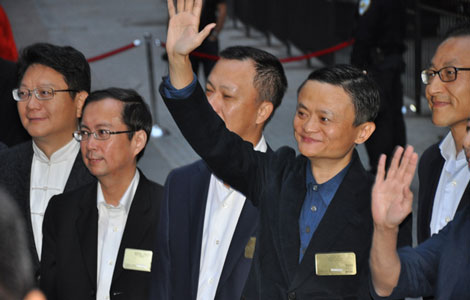
 Alibaba IPO on NYSE
Alibaba IPO on NYSE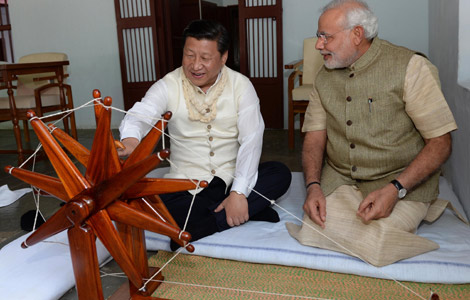
 Benefit of teaming up goes beyond borders
Benefit of teaming up goes beyond borders
 Beijing center hosts art exhibition inspired by LA
Beijing center hosts art exhibition inspired by LA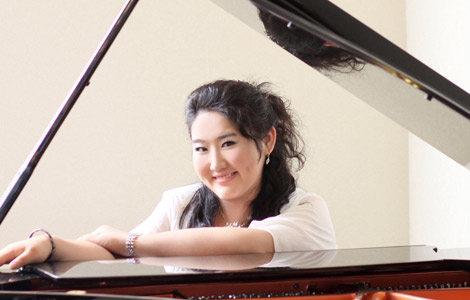
 Young pianist joins an elite roster
Young pianist joins an elite roster
 WWII relics put on display
WWII relics put on display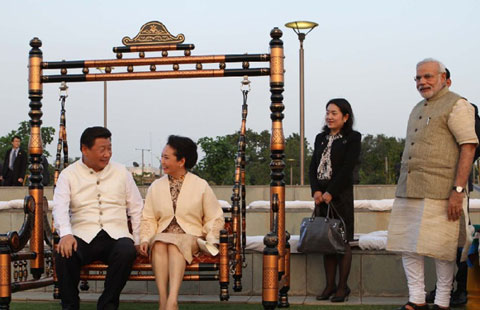
 President Xi and wife play swing in Modi's home state
President Xi and wife play swing in Modi's home state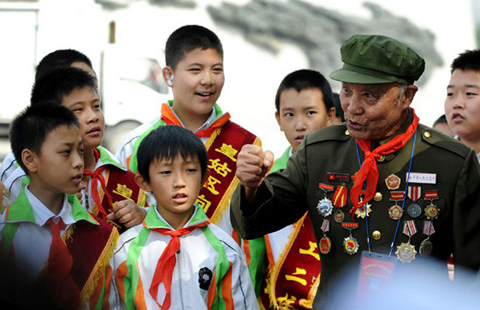
 9.18 Incident marked in China
9.18 Incident marked in China
 PLA's 'Gold Helmet' air battle contest takes off
PLA's 'Gold Helmet' air battle contest takes off
Most Viewed
Editor's Picks

|

|

|

|

|

|
Today's Top News
Alibaba jumps more than 40% in trading debut
Alibaba shares surge 46% in their debut
Alibaba to rise more than 30% in trading debut
Alibaba expected to open at $80-$83 in debut
Alibaba makes its mark on Wall Street
China's e-commerce giant Alibaba debuts at NYSE
Carbon issue consensus is expected at UN
Off-limit investment list should get shorter, premier says
US Weekly

|

|
